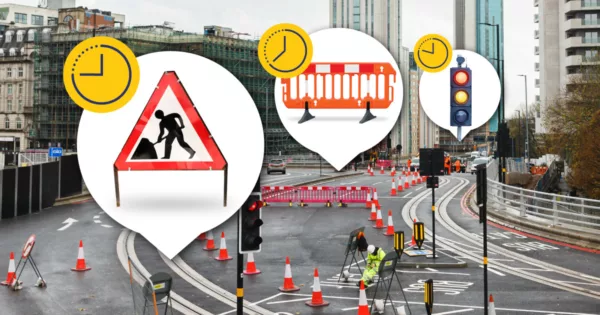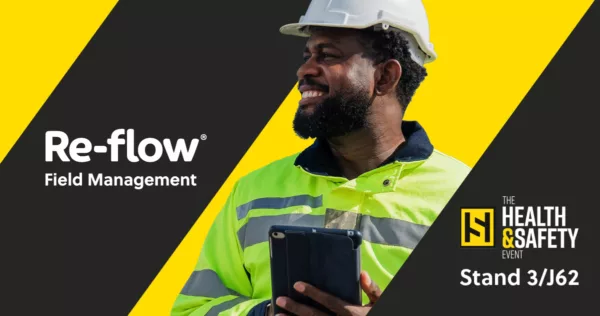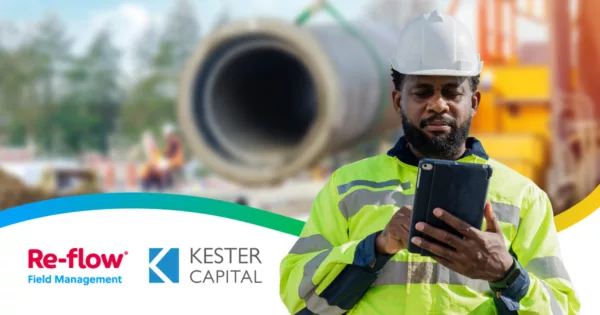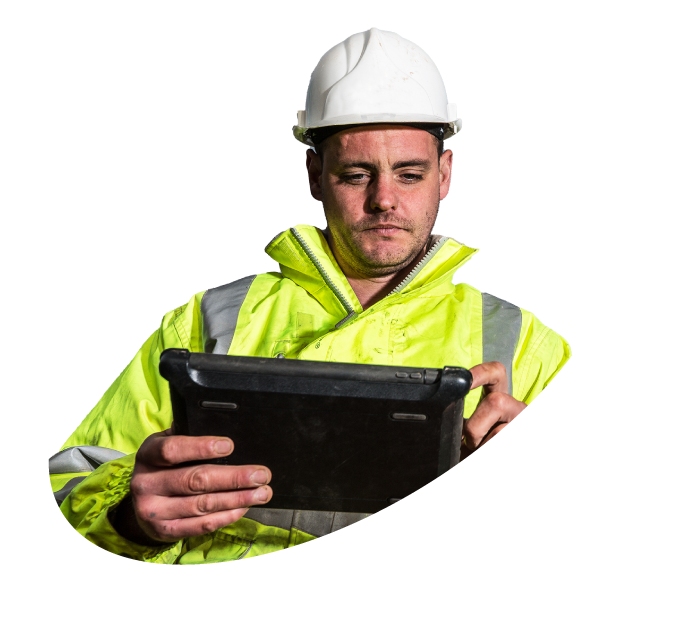
News
Re-flow: The Conversation – Uncovering the Less-Understood Issues in Highways
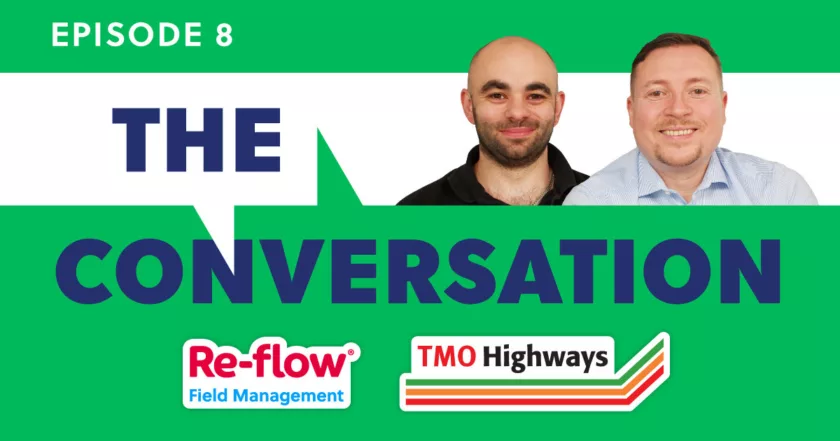
Episode 8 of THE CONVERSATION provides a resource as interesting to members of the workforce as it really should be to members of the public. Topics like incursions, worker mental health, suicide prevention, and employee wellbeing deserve to be part of the national conversation. After all, Highways, like other areas of big infrastructure, are too important to exist as a national afterthought.
This episode offers an exciting new format for the podcast. We filled a bag with some challenging, industry-specific questions. The questions probed issues from combating the high level of mental health issues in Highways to how technology can solve issues like worker abuse.
This week’s show features industry experience and insights from Mark Haysman (managing director) and Jamie Lange (operations and fleet manager) of TMO Highways – their voices and their voices only. Mark and Jamie cover the issues mentioned above, and plenty more.
TMO Highways are a market-leading traffic management company covering East Anglia, London, and the south-east of England. They were established in 2014, and also specialise in event and pedestrian management. They have a forward-thinking approach towards workplace management and environmental sustainability. For our money, they’re a powerful example of a big infrastructure business taking on the multiple challenges of the modern workplace, and excelling in the process.
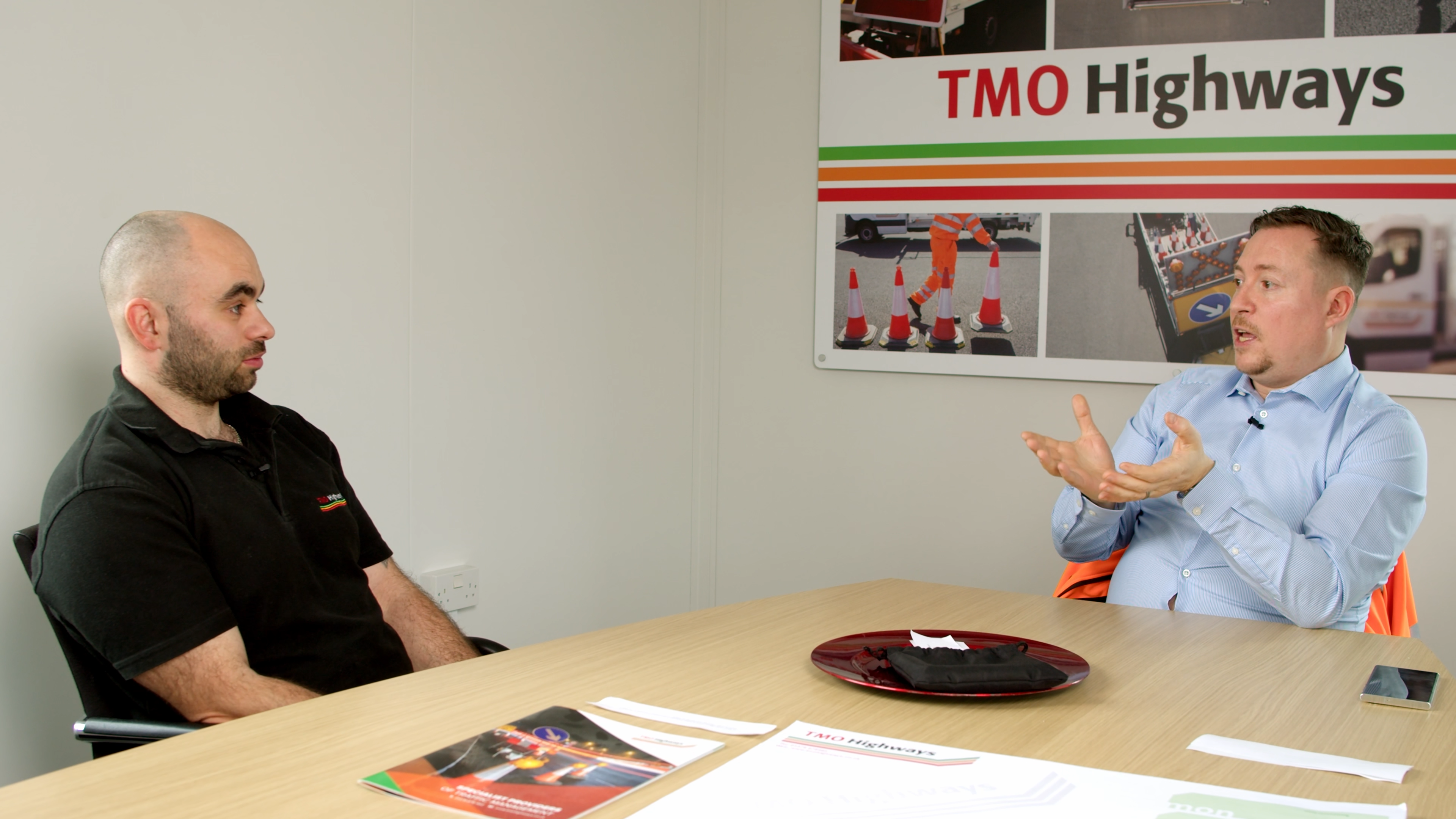
The Conversation Itself
Question 1: Another arm of health and safety is employee well-being. How much do you think company culture can affect the well-being of its employees and its impact on the day-to-day running of a business?
Mark Haysman: Employee well-being is really important in the industry, as I think it is in construction in general. There's a really high level of suicide and poor mental health. So it's really important that the companies that work within those industries are looking after their team and their people.
Jamie Lange: Definitely.
Mark Haysman: What do we do to ensure the well-being of our people?
Jamie Lange: If anyone has any issues, they can always come to management.
Mark Haysman: We have a support network, not just internal, but external as well. This is Peninsula (who provide abundant employee wellbeing options). So Peninsula is a really good service that an employee can go to and can get advice – whether that's advice about bereavement, or debt, whatever it is. Employees have that option, somewhere they can go.
Because they might not want to come to HR. They might not want to come to me or to come to Jamie. So they need that alternative.
Jamie Lange: Somewhere independent.
Mark Haysman: Exactly. And I also think personally, a work and a home life balance is really important. It's something that we've really push for at TMO. We all need downtime.
Jamie Lange: Of course, yeah. Like you say, if you don’t rest, then you’re putting your mental health at risk. You might just have needed a time out, but you’ll be back onto Peninsula instead.
Mark Haysman: In terms of our culture at TMO, we encourage people to try and get a break. They're not working seven days a week. Those days have kind of gone. We monitor people's working hours and we ensure that they get breaks during the work day. I think that's really important.

Question 2: What is the biggest health and safety challenge in the industry? And what is the biggest health and safety challenge specifically for TMO?
Mark Haysman: I would say the biggest issue right now is road worker abuse. I think there's a higher risk for our people these days. It's escalating. We've had situations, as you know, where operatives have been confronted with people with knives.
Jamie Lange: Yeah.
Mark Haysman: Central London is a really difficult place to work. You put steps in place to ensure the people are safe, or as safe as they can be. That's the area that I think the main focus needs to be on in the industry.
We've signed up, as you know, to the Stamp It Out campaign, which is a message that really is impactful. It's emotional.
There's a video – I don't know if you've seen it on LinkedIn – they've actually got people that have been put in those situations, and they talk about their experiences. That's really powerful.
I'd like to see other bodies get behind that and maybe do an ad campaign to push and to educate the public. What other way can we educate people about roadworks? There's very little about it in any highway code.
Jamie Lange: Exactly. Yeah. There's nothing.
Mark Haysman: So do we need to do it through social media? Do we need to try to educate people through TikTok, or through Facebook, or Instagram? Maybe there are tools out there that we can use better, that we can use to promote the message and why it’s important.
Question 3: As an Alcumus SSIP accredited business and with your commitment to health and safety, what does a safe working environment mean to you? And how does TMO uphold those safety standards to such a high degree?
Jamie Lange: TMO is a safe place to work really.
Mark Haysman: And that's exactly what we need to promote, taking care of our workers.
Jamie Lange: Everything is covered – from ensuring all the correct PPE all the way to looking after the operator itself.
Mark Haysman:
People talk about culture. They talk about how a business builds a health and safety culture. But we look at something bigger than a culture. We look at the whole environment. We want our people to be safe. We want our people to go home to their family, to their loved ones, at the end of the shift. So we're passionate about what we do.
Jamie Lange: Yes.
Mark Haysman: Our people, I think, will recognise the efforts that we take to make sure they're safe. Our safety record is one that I'm really proud of.
And as a management and senior leadership team, everyone's focused on that aspect. Look at what we've done with our qualifications. So we secured the ISO 45001, an occupational health and safety management system. That was a really big focus for us. We're also SSIP accredited, which is really good. But the 45001 really takes it to that next level.
What’s more, our customers recognise and appreciate our excellent levels of health and safety. We give them our statistics. So not having the RIDDORs, not having incidents and accidents is good because we can report back to our customers and demonstrate that we do things safely.
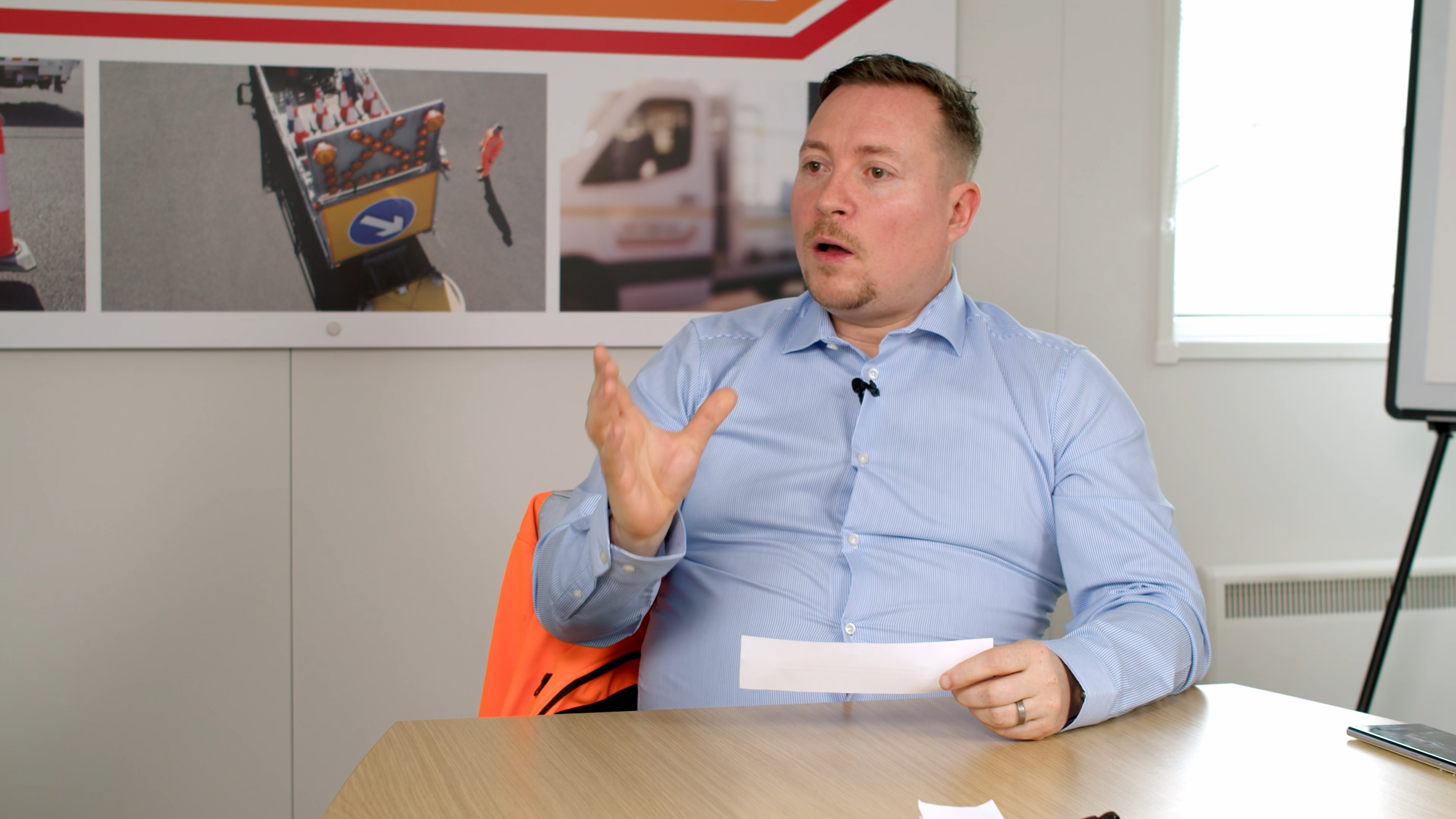
Question 4: A hot topic at the moment is the abuse of road workers. As a company whose core values include respect and safety, how do you feel about the number of these types of incidents and how would you go about eliminating them?
Mark Haysman: Digital technology is really advanced and is still advancing within the industry. So having CCTV pods, Intellicones, and smart closures shows our customers that we are keeping them and our team safe.
I also think that fines are not really a deterrent. We need to do more. Not just with custodial sentences, but I think fines should be put at a level that makes people think twice about making those choices.
Jamie Lange: To make people realise that they’ve just driven through an open work site.
Mark Haysman: And put X amount of people at risk.
Question 5: How does TMO encourage diversity and how do you think a more inclusive company culture can impact overall wellbeing?
Mark Haysman: Being an inclusive company means having a cross section of people. People from all types of race, religion, sexual preference – whatever that is. I think that is a benefit for a company because you're going to have a cross section of types of communication.
So the company is better and healthier. There are no barriers. Nobody is going to stop you joining TMO because you're a female, for example. We’ve got a variety of operatives out in the field. I think for us as an industry it's something we need to push.
Question 6: The industry talks a lot about innovation. How do you think technology can improve health and safety standards? Do you have a crazy out-of-the-box idea you could try to implement if you had unlimited funding?
Digital technology is constantly advancing. We're seeing with Re-flow that the development is moving quickly. It’s the same within digital technology, and traffic management. We're minimising the need for maintenance by having a tracker put on the signage for example. We're able to properly monitor where our first cone and last cone is. We're able to demonstrate to our client that we did our jobs on time. We've got technology which means that if a taper is struck, we know about it, and we can react to it. So yeah, I think everyone needs to embrace technology. This industry has always been a little bit antiquated, you know, it's always been pen and paper.
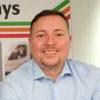
Managing Director
TMO Highways
Mark Haysman: We've pushed those boundaries but what's next?
Jamie Lange: Yeah.
Mark Haysman: What's the vision? Where do we go from here? 10 years ago we didn't even have an iPad to do our paperwork.
I think it'll be exciting to see how things progress.
Jamie Lange: Yeah, it's a bit like the traffic lights now with your auto green function and everything else.
Mark Haysman: Fantastic. So intelligent lights are a really, really big selling point at the moment. We don’t need as many manual controls. We’re reducing our carbon footprint because we're not having to go to site so frequently. How can we help to reduce the number of miles that we do?
As a company we did 2 million miles last year. That’s a lot of miles.
Jamie Lange: It's a lot, yeah.
Question 7: TMO values sustainability. Have you changed your purchasing policies and processes to ensure you're using greener energy and more recyclable materials?
Mark Haysman: We’ve definitely changed our purchasing policies. We've looked at greener options.
Sometimes those greener options are more expensive, but you have to look at their environmental impact and how that will impact the business and how that will impact the greater good.
The environment is a massive subject. If we don't make change today, it's going to have a negative impact in the future.
Jamie Lange: All our cones are recyclable, for instance. And we have skips in depot to recycle them.
Mark Haysman: Yeah.
Jamie Lange: Same as the bases, they're all recyclable items.
Mark Haysman: And we've got our plastic frames, which are lighter. Which means we're not carrying as much weight on our vehicles, which reduces the amount of fuel that we're using. Re-flow is a good example of improvements in this area. Think how much paper that's now not used within business.
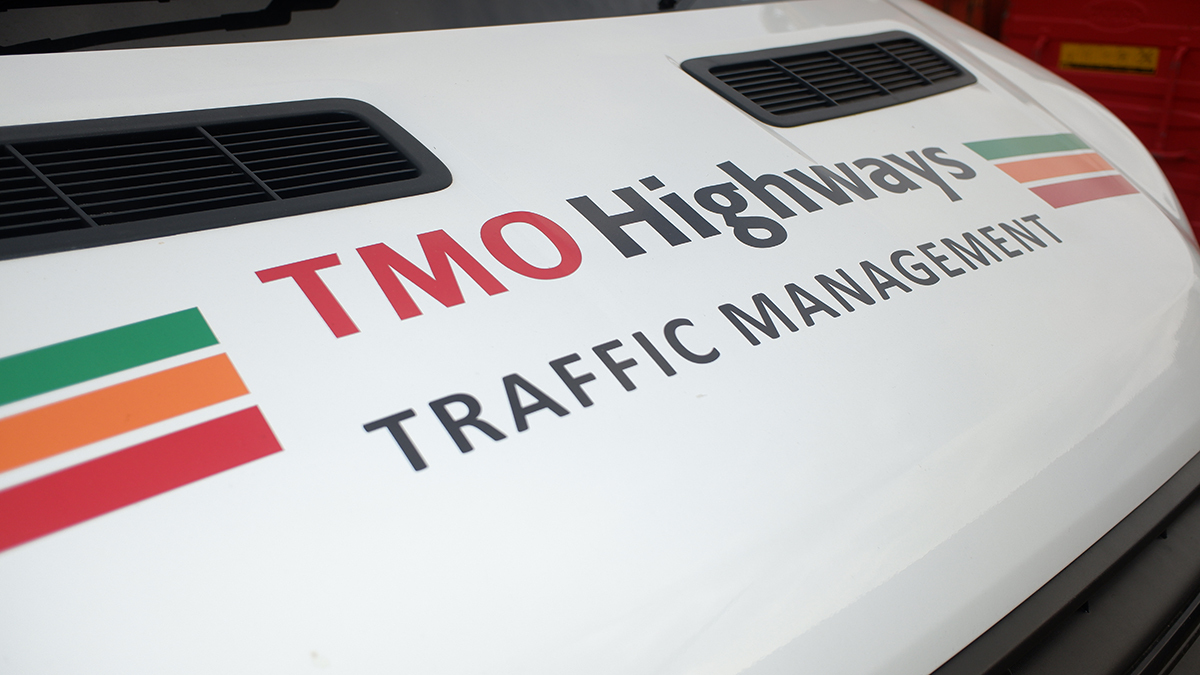
Question 8: In what is still a largely male dominant industry, how do you approach the topic of work-related mental health? Do you feel the community support and available resources are sufficient and beneficial? And do you ever access them?
Mark Haysman: I think mental health is a really poignant subject in the industry. I think there's too much suicide.
Jamie Lange: Yeah.
Mark Haysman: There are too many mental health issues and people with mental ill health. We've got to support people through those difficult challenges. We all go through difficulties like that in life.
We all have bereavement. We all have breakups within our relationships. So how do we support people?
People are really important to the business. So you've got to be able to support them. You've got to be able to look after them. We've got mental first aiders, people they can talk to. We've got Peninsular who will offer that advice and support if they want to do that privately.
I think that's a really good point and a good reason why people join TMO because we respect how big this issue is.
We also regularly support various charities. We support a male suicide charity, for example. We donated to that based on an event that happened on one of our jobs, an attempted suicide that was stopped. If we can encourage our people and support them, then we’re going to have a happier workforce.
Jamie Lange: It's helpful when everyone is open to talking. So anyone who's got an issue can just come and talk.
Mark Haysman: HR is an open door. We encourage our staff to use that door, to talk to their manager. And if they don't feel comfortable talking to their manager, then there's always a director who will be available.
Question 9: You chose to completely digitise your field management with Re-flow software and apps. Since using Re-flow, have you seen a positive effect on health and safety within TMO? If so, what?
Jamie Lange: Well, with Re-flow everything is in one place. So you can access everything within the app.
Mark Haysman: So the knowledge is all there. We can upload all of our documents. We can upload all of our generic risk assessments and method statements.
Being able to do the actual ‘point of risk’ on the app on site has improved things massively. We haven't been reliant on people coming back with a piece of paper and having that bit of paper end up on somebody's desk, or in a drawer never to be seen again. It's all available all the time.
It's all there. Our coordinators can review everything. We can make sure that all risks are being looked at.
That can only be a positive thing.
To hear the full TMO Highways story watch the full episode above, or listen on Spotify, Google Podcasts, Apple Podcasts and YouTube.
Stay ahead with exclusive insights from industry experts
Subscribe to "The Conversation" today
